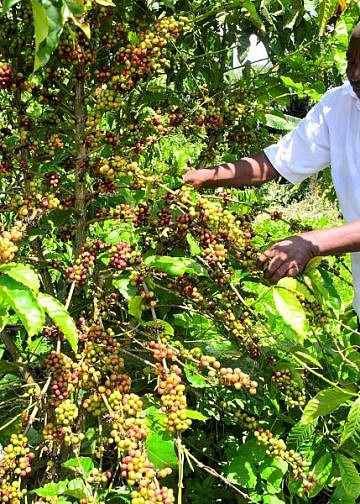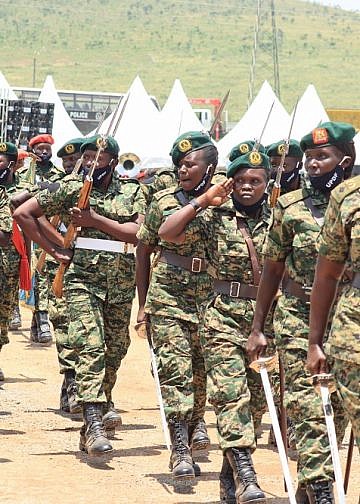A retired civil servant has hailed President Museveni for his advice that he said opened his eyes to start reaping from coffee farming.
Mr. Julius Akorinako,68 retired as the District Inspector of Schools in Kamwenge in 2017 before venturing into coffee farming.
“When I retired, I didn’t know what was next. I was earning little from maize, and the returns were discouraging,” Mr. Akorinako recalled during President Museveni’s visit to his farm in Kamwenge district.
“But I remembered what President Museveni always told us during his rallies here in Kamwenge saying that Maize has no money and that If we wanted to get out of poverty, we should venture into coffee , fruits , poultry and others. That message stayed with me,” he said.
In 2019, Mr. Akorinako, a resident of Lwamugonera cell, Rwenkuba ward, Kahunge Town Council, Kibale County, Kamwenge district acted on the president’s advice.
He started with just two acres of clonal coffee seedlings from a coffee nursery bed and within two years, he had his first harvest.
“In the first season alone, I earned Shs 5m. After expenses, I remained with Shs 3m in profit. That was proof that I had made the right choice,” he said.
Encouraged by the success, he gradually expanded his coffee plantation to six productive acres. Today, Mr. Akorinako earns Shs 20m every four months with an annual net income of about Shs 40m.
“I thank President Museveni for opening my eyes. I advise fellow Ugandans to take his advice seriously. I have seen the results myself, and my life has changed,” he said.
Thanks to coffee farming, Mr. Akorinako has not only improved his daily livelihood but also transformed the future of his family.
“My children have gone for further studies; some even hold master’s degrees. That wouldn’t have been possible without the income from coffee,” he proudly noted.
Mr. Akorinako’s farm now employs 20 permanent workers, each earning Shs 200,000 monthly, alongside up to 60 casual laborers who work on a weekly basis. Beyond coffee, Mr. Akorinako grows bananas on four acres, beans, mangoes on one and a half acres and rears 60 goats.
“I’ve also invested in irrigation to boost productivity during drought. I use a solar power generator for irrigation to cover five acres, especially for the coffee and the bananas,” he explained.
Reflecting on his journey from retirement uncertainty to agricultural success, Mr. Akorinako believes his story can inspire others.
“Retirement is not the end. It’s a new beginning. With the right mindset and the right crops, you can thrive,” he said.
Speaking in response, President Museveni applauded the people of Kamwenge District for embracing mindset change and transforming their economic practices by shifting from subsistence farming, especially maize, to more productive ventures like coffee growing.
“Thank you for listening to my advice and now inspiring others,” President Museveni said.
He highlighted that this transformation began when residents chose to act on the message he had consistently preached.
“When I came here in Kamwenge, people were planting maize. You would find Someone telling you they had two acres and were making only sh600,000 gross. I asked them don’t you see that that’s blindness?” he said.
President Museveni emphasized that real poverty is often rooted in ignorance and poor decision-making.
“Darkness of ignorance is like murder,” he said.
He also reflected on how past migrations like those of the Bakiga from Kabale were driven by perceptions of scarcity and poor land planning.
“Some left Kabale claiming it was full, yet it wasn’t. They came and took land here, but no one advised them that what drove them from Kabale could also drive them from Kamwenge if they didn’t plan better,” he noted.
The president warned that large families living on undivided land without a productive plan risked future suffering.
“Each home has about 10 people. If you don’t stop this kind of approach, what will happen to the next generation?” he asked.
Addressing the dangers of land fragmentation, President Museveni encouraged Ugandans to adopt modern systems of land management.
“When we started the student movement in the 1960s, we were already seeing the problems. The enclosure system and inheritance practices were dangerous. If you stay together without dividing the land, then you can share the net profits,” he said.
He praised individuals like Mr. Akorinako for embracing irrigation, planting pasture, and investing in solar power.
“You can’t just sit and wait for rain, then when it doesn’t come, you blame God. In Genesis, God said, ‘Go and multiply,’” he said.
President Museveni also advised Mr. Akorinako not to divide his land but to register a company where every family member can benefit from the joint enterprise.
To support him further, the President donated Shs 12m for the purchase of two more cows and a Fuso truck.
The First Lady and Minister of Education and Sports, Janet Kataaha Museveni, expressed deep gratitude to God for the role the NRM government has played in transforming the lives of Ugandans.
“I thank God for the NRM government and the burden it has carried for a long time to transform the country and to try and see that it uses its money to awaken the lives of Ugandans. This has always been the problem of many African governments. They had not discovered that their role is about improving the lives of the people,” she said.
She particularly praised the government’s deliberate outreach efforts to reach ordinary citizens where they live.
“Thank you, the president, for taking your time to visit the homes of the people. This is something new in Africa, and leaders should adopt it because it restores hope in the lives of our people,”she said.
The First Lady further expressed hope that Uganda will continue on its path to full independence and self-reliance.
“I hope that Uganda will become even better than this and be completely independent, not partially depending on others. I thank God so much, and I pray that when people understand what the government is doing and take up their role to lift themselves and the country, then Uganda will be even better,” she said.
The Deputy Speaker of Parliament, Thomas Tayebwa commended leaders in Kamwenge District for listening to the president’s guidance on enterprise selection and transforming from subsistence farming into commercial agriculture, particularly coffee farming.
“ Even in my home area, we were only growing bananas and making waragi, but today we have transformed
into coffee farming and other enterprises,” Tayebwa said.
He praised Kamwenge’s progress as a model for other regions, showing the power of mindset change and practical implementation of government programs like the Parish Development Model (PDM).
The Minister of Agriculture, Animal Industry and Fisheries, Frank Tumwebaze, lauded the President for spearheading the transformation of Kamwenge District, particularly through the promotion of coffee farming, improved infrastructure, and strengthened security.
Tumwebaze, who also serves as the Member of Parliament for Kibale County, recalled how President Museveni personally encouraged a shift from maize to coffee production over two decades ago.
“Your Excellency, in 2004 you directed me and the RDC at the time and asked, ‘You, the people of Kamwenge, when will you stop planting maize?’ You came to the district and trained us, and since then, both political and religious leaders embraced the change,” Tumwebaze said.
He noted that the shift to coffee has paid off significantly.
“According to your statistics, six out of every ten homesteads in Kamwenge now have coffee. Those with large pieces of land still grow some maize, but the majority have transitioned to coffee farming.
Tumwebaze also lauded the government’s flagship Parish Development Model program for empowering rural households economically.
“We thank you for the PDM. Over 150,000 homesteads have received the funds. It’s changing lives,” he said.
The minister further expressed gratitude for the continued development of infrastructure, particularly the Ibanda–Kabarole Road, and the expansion of electricity coverage.
“We thank you for the road and for ensuring that our region is connected to electricity,” he said.
He also acknowledged the role of religious leaders in fostering unity in the region.
“Our religious leaders have really helped us to remain united,” he stated.
The Woman Member of Parliament for Kamwenge District, Sylvia Bahireira Tumwekwase, also applauded the president for his prompt intervention during recent security threats and for his continued commitment to the peace and stability of the region.
The event was also attended by the Minister of ICT and National Guidance, Dr. Chris Baryomunsi, local leaders, among others.










































